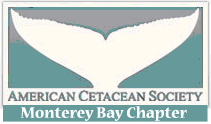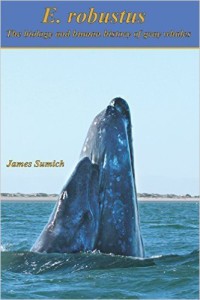
North Pacific gray whales, the eastern/western paradox
Thursday, December 10, 2015
7 p.m. Refreshments, 7:30 p.m. Program
Lecture Hall, Monterey Boatworks, Hopkins Marine Station,
Pacific Grove (Across from American Tin Cannery Outlet Stores)
Speaker: Dr. Jim Sumich, Oregon State University Fisheries and Wildlife Courtesy Faculty
Just as this year’s gray whale migration is starting, we’re going to hear from Dr. Jim Sumich, a noted gray whales researcher who has studied the giant animals from British Columbia to Baja California for the past 40 years. Jim will be speak at the December 10th meeting, talking about current research that is helping clarify management issues of the two gray whale populations – some 20,000 in the eastern population, fewer than 150 in the critically endangered western population.
Much of his research has been focused on the growth of young gray whales and the impacts they had on their lactating mothers.
A longtime college professor, Jim recently published a definitive gray whale book, E. robustus: The biology and human history of gray whales. It has been available at recent ACSMB meetings and the author said he will be happy to sign copies at this appearance. He previously wrote a best-selling textbook on marine biology and is co-author of a recent third edition of Marine Mammals: Evolutionary Biology.
He lives in Corvallis, Oregon, where he has taught marine mammal courses at OSU.
Please join us for refreshments before the program begins.
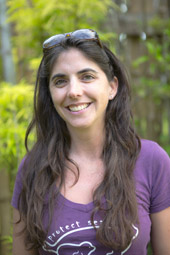
How citizen scientists contribute to research and conservation of marine mammals
Thursday, October 29, 2015
7 p.m. Refreshments, 7:30 p.m. Program
Lecture Hall, Monterey Boatworks, Hopkins Marine Station,
Pacific Grove (Across from American Tin Cannery Outlet Stores)
Speaker: Dr. Lei Lani Stelle
University of Redlands associate professor of biology,
Earthwatch researcher
Dr. Lei Lani Stelle, who leads studies of whales and dolphins off Southern California with her students and Earthwatch volunteers, will be our speaker at the October meeting. Her recent research has been focused on human impacts on marine mammals.
Dr. Stelle incorporates citizen science into the effort in order to expand the monitoring of distribution, behavior and physiology of local cetaceans and pinnipeds. She initiated and co-developed Whale mApp, a GIS-based web and mobile tool to encourage public reports of animal sightings. The GIS maps display the sightings and help model the habitat and determine human disturbances.
She has been working with marine mammals since she was an undergraduate in marine biology at UC Santa Cruz. She went on to study the biomechanics of swimming in Steller sea lions and earned her master’s from the University of British Columbia, then her doctorate from UCLA where she investigated the foraging ecology of gray whales.
Please join us for refreshments before the program begins.
Learn more about Dr. Lei Lani Stelle.
September 2015
Marine Life of High Latitudes
Thursday, September 24, 2015
7 p.m. Refreshments, 7:30 p.m. Program
Lecture Hall, Monterey Boatworks, Hopkins Marine Station,
Pacific Grove (Across from American Tin Cannery Outlet Stores)
Speaker: Greg McCormack, Monterey Bay Whale Watch
Our September speaker will be Greg McCormack, who will talk to us about the marine life of the high latitudes from Alaska and Siberia to Antarctica. He will share with us his thoughts on aboriginal whaling and interpret an amazing predation event video he witnessed of the Pack Ice Killer Whale.
He has thirty years’ experience in developing interpretive programs for the California State Parks and National Park Systems, The Nature Conservancy, Audubon, Catalina Island Marine Institute, NatureBridge and an environmental educator in the Peruvian Amazon. Greg has worked as the Big Sur District park interpretive specialist, an Alaskan river guide, kayak expedition leader in Glacier Bay and along the “Orca Highway” in the Salish Sea. He is a PADI Divemaster, leading divers on underwater tours in dozens of island archipelagos in the South Pacific from Indonesia to Micronesia, New Guinea to Palau, Guam to Vanuatu and Hawai’i to Easter Island.
Greg has been a naturalist in a dozen parks, including: Mount Rainier, Everglades, Grand Canyon, Hawaii Volcanoes, Point Reyes National Seashore and Denali National Park and Preserve, among others. He has served as expedition leader, cruise director, lecturer and Zodiac driver onboard adventure-travel expedition ships, guiding people to the most remote regions of the world.
Before coming to Monterey Bay Whale Watch, Greg did a five-year stint as an education specialist for the NOAA’s Olympic Coast National Marine Sanctuary. An endurance athlete, Greg has bicycled the entire length of the Americas – 18,500 rugged, adventurous miles through 20 countries – from Prudhoe Bay, Alaska to Ushuaia, Argentina.
Please join us for refreshments before the program begins.
Thursday, August 27, 2015
7 p.m. Refreshments, 7:30 p.m. Program
Lecture Hall, Monterey Boatworks, Hopkins Marine Station,
Pacific Grove (Across from American Tin Cannery Outlet Stores)
Speaker: Paul Clerkin
Pacific Shark Research Center, Moss Landing Marine Laboratories
Paul J. Clerkin is a graduate researcher at the Pacific Shark Research Center of Moss Landing Marine Laboratories. Clerkin specializes in rare and deep-sea chondrichthyans and is focusing on new species descriptions and life histories of poorly understood sharks species.
His thesis work is with David A. Ebert, studying sharks encountered during two surveys in the Southern Indian Ocean in 2012 and 2014, a total of 126 days at sea. He has also conducted research for other projects aboard ships in the Bering Sea, South East Atlantic, Philippines Sea, and across the Pacific. He is currently describing some of the 15 new species he discovered in the Indian Ocean and planning his next expedition.
Please join us for refreshments before the program begins.
July 2015
ACSMB Annual Barbecue
Saturday, July 25, 2015
Starting at 3 p.m.
George Washington Park
Sinex Avenue at end of Alder Street, Pacific Grove
(One block east – direction away from Asilomar – of 17 Mile Drive)
Celebrating 35 years of whale and cetacean research, education and conservation
(Monterey Bay Chapter founded in June 1980)
BBQ and Raffle
Grilled tri-tip, chicken, sausage,
Salads, beans, rolls, cake,
Water, soft drinks, coffee
Bring your own table service
(and cash for fabulous raffle tickets)
$20 per person
Send RSVP payments to ACSMB, P.O. Box HE, Pacific Grove, CA 93950
For more information, call 831-373-4281
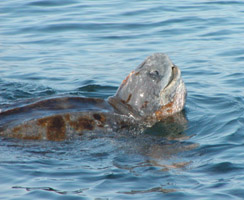
photo by Scott Benson
Leatherback turtles in the California Current: Why leatherbacks cross the Pacific
Thursday, June 25, 2015
7 p.m. Refreshments, 7:30 p.m. Program
Lecture Hall, Monterey Boatworks, Hopkins Marine Station,
Pacific Grove (Across from American Tin Cannery Outlet Stores)
Speaker: Scott Benson
Sea turtle research program, NOAA’s Southwest Fisheries Science Center
Scott Benson has been concentrating on research on leatherback turtles for the past 14 years, studying them from their nesting areas in New Guinea and Indonesia to their feeding areas in Monterey Bay. He will tell us about the declining populations that recently got the Pacific Leatherback Sea Turtle added to NOAA’s list of 8 endangered species most at risk of extinction in the near future.
The other species on the list are white abalone, Southern resident killer whale, Sacramento River winter-run Chinook salmon, Central California Coast Coho evolutionarily significant unit, Hawaiian monk seal, Cook Inlet beluga whale, and Atlantic Salmon Gulf of Maine distinct population segment.
Scott will also be discussing the endangered sea turtle’s biology, distribution, movements and foraging ecology.
He has been a marine scientist with NOAA’s Southwest Fisheries Science Center for more than 20 years and became part of the sea turtle program in 2001, coordinating research on the leatherbacks in Central California and the Western Pacific. He earned his master’s degree from Moss Landing Marine Labs in 2002.
Please join us for refreshments before the program begins.
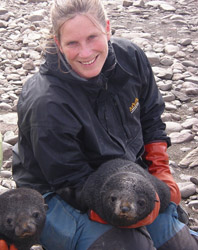
Pushing the limit: Diving physiology and energetics of marine mammals
Thursday, May 28, 2015
7 p.m. Refreshments, 7:30 p.m. Program
Lecture Hall, Monterey Boatworks, Hopkins Marine Station,
Pacific Grove (Across from American Tin Cannery Outlet Stores)
Speaker: Dr. Birgitte McDonald
Vertebrate Ecologist, Assistant Professor, Moss Landing Marine Labs
Dr. Birgitte McDonald, who came to Moss Landing Marine Labs in January to take a position as an assistant professor of vertebrate ecology, will talk to us about the diving physiology and capabilities of marine mammals and their roles in the ecosystem. Specifically, she will discuss her recent research with California sea lions and harbor porpoises.
Using bio-loggers attached to animals, Dr. McDonald investigates how breath-hold divers manage their oxygen stores during natural dives. The research suggests that diving animals have the ability to regulate heart rate in relation to dive type, dive duration and activity. “Understanding the physiological mechanisms that determine the diving ability will allow us to predict how they will respond to changes in prey availability,” she told a recent interviewer for the labs’ Wave magazine.
Dr. McDonald started at Moss Landing after finishing studies of harbor porpoises in Denmark as a National Science Foundation International Research Fellow. She earned her master’s from Sonoma State University, doctorate from UC Santa Cruz, and did post-doctoral research at Scripps Institution of Oceanography, studying oxygen management in sea lion foraging dives, before going to Denmark as an NSF researcher.
Please join us for refreshments before the program begins.
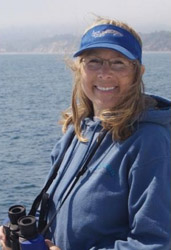
Gray Whale Census and Behavior Project
Thursday, April 30, 2015
7 p.m. Refreshments, 7:30 p.m. Program
Lecture Hall, Monterey Boatworks, Hopkins Marine Station,
Pacific Grove (Across from American Tin Cannery Outlet Stores)
Speaker: Alisa Schulman-Janiger
Director, ACS/LA Gray Whale Census and Behavior Project
We should be in for up-to-the-minute news of gray whales this month as Alisa Schulman-Janiger tells us about the annual census by the Los Angeles Chapter of the American Cetacean Society. She has been director of the census project for 31 years, training and coordinating volunteers who sit high above the Pacific in Palos Verdes and watch gray whales swimming past on their annual migration between Alaska and Mexico.
In addition to observing the migration, Alisa is coming to Monterey after a week with the whales in Baja.
The Southern California observers see only a portion of the gray whales as most of them migrate through the Channel Islands. By the beginning of April this year they had counted 1,898 gray whales going south, including a remarkable 50 calves apparently born on the way. And they had seen 1,432 on the way back north, including 16 calves.
Alisa is a marine biologist (degree from CSU Long Beach) who taught in San Pedro High’s Marine Science Magnet School for 21 years. In addition to her expertise with gray whales, she has studied humpbacks, orca and porpoises with the National Marine Mammal Lab in Alaska, and founded the California Killer Whale Project.
Please join us for refreshments before the program begins.
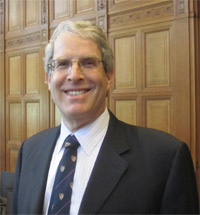
Scientific whaling
Thursday, March 26, 2015
7 p.m. Refreshments, 7:30 p.m. Program
Lecture Hall, Monterey Boatworks, Hopkins Marine Station,
Pacific Grove (Across from American Tin Cannery Outlet Stores)
Speaker: Dr. Marc Mangel
Distinguished Research Professor, Mathematical Biology
Director, Center for Stock Assessment Research UCSC
Dr. Marc Mangel was the independent scientific expert called by Australia in its case in the International Court of Justice challenging the legality under international law of the Japanese Special Permit whaling program in the Antarctic. The court concluded the program was not for purposes of scientific research, thus in violation of the treaty.
He will briefly describe the history leading up to the case, his role, the case itself, and the reasoning of the court and its implications.
Dr. Mangel has directed the Center for Stock Assessment Research since 2002, a partnership of USCS and the National Marine Fisheries Service that trains students in quantitative methods needed for ecosystem based fishery management to improve sustainability.
He obtained his bachelor’s and master’s degrees from the University of Illinois (physics, biophysics) and his PhD (applied mathematics and statistics) from the University of British Columbia in 1978. Dr. Mangel has supervised more than 50 undergraduate research projects, 28 PhD candidates and more than 30 post-docs.
Please join us for refreshments before the program begins.
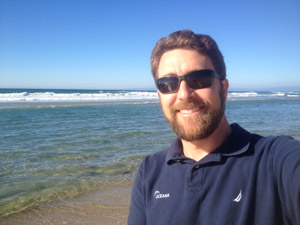
Reducing bycatch of cetaceans in one of the nation’s dirtiest fisheries
Thursday, February 26, 2015
7 p.m. Refreshments, 7:30 p.m. Program
Lecture Hall, Monterey Boatworks, Hopkins Marine Station,
Pacific Grove (Across from American Tin Cannery Outlet Stores)
Speaker: Dr. Geoff Shester
California Program Director, Oceana
Drowning marine mammals and turtles snagged in gillnets – a challenge nagging ocean conservationists – is part of our February program as Dr. Geoff Shester tells us about the California swordfish industry and its drift gillnets. It is now considered one of the “dirtiest” bycatch fisheries in the nation.
Dr. Shester studied ways to reduce bycatch in nearshore gillnet fisheries while working out of Hopkins Marine Station, earning his doctorate from Stanford’s Interdisciplinary Program in Environment and Resources. Now Oceana’s California Campaign Director, he’s working on ways to reduce bycatch in gillnet and trawl industries, as well as protecting forage species in the California Current ecosystem, and restoring endangered Pacific sea turtle and shark populations.
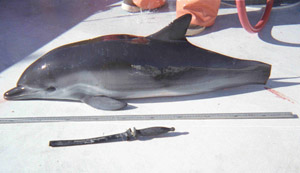
Geoff graduated from UCSC with a double major in biology and environmental studies before joining Oceana in Alaska. He remained an Oceana consultant while working on his doctorate, then joined the Monterey Bay Aquarium staff as senior science manager of the Seafood Watch Program. After a few years, he returned to Oceana and works out of the Monterey office.
Please join us for refreshments before the program begins.
Related web page: Biography of Dr. Geoff Shester
January 2015
The great white fear: how 500 shark species have been reduced to one
Thursday, January 29, 2015
7 p.m. Refreshments, 7:30 p.m. Program
Lecture Hall, Monterey Boatworks, Hopkins Marine Station,
Pacific Grove (Across from American Tin Cannery Outlet Stores)
Speaker: Victoria Vásquez, graduate student
Pacific Shark Research Center, Moss Landing Marine Lab
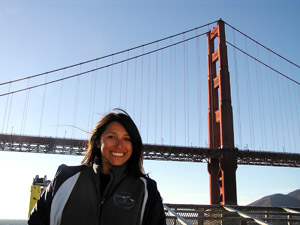
“At shark events people are absolutely talking about great whites,” she said. “When other species of sharks are mentioned, interest drops.”
Vicky is a native of San Diego. She worked as a youth marine educator for seven years before starting her graduate studies. At the Ocean Discovery Institute in San Diego she taught young students, some who had never been to the beaches near their homes, how to snorkel and see ocean resources up close. She also served as translator between English speaking staff and Spanish speaking students. After that she worked with the Marine Science Institute in San Francisco as a program manager.
Vicky has also volunteered with a number of ocean conservation organizations in the Bay Area and last year became deputy director of a new organization named Ocean Research Foundation.
Please join us for refreshments before the program begins.
Related web page: Pacific Shark Research Center
